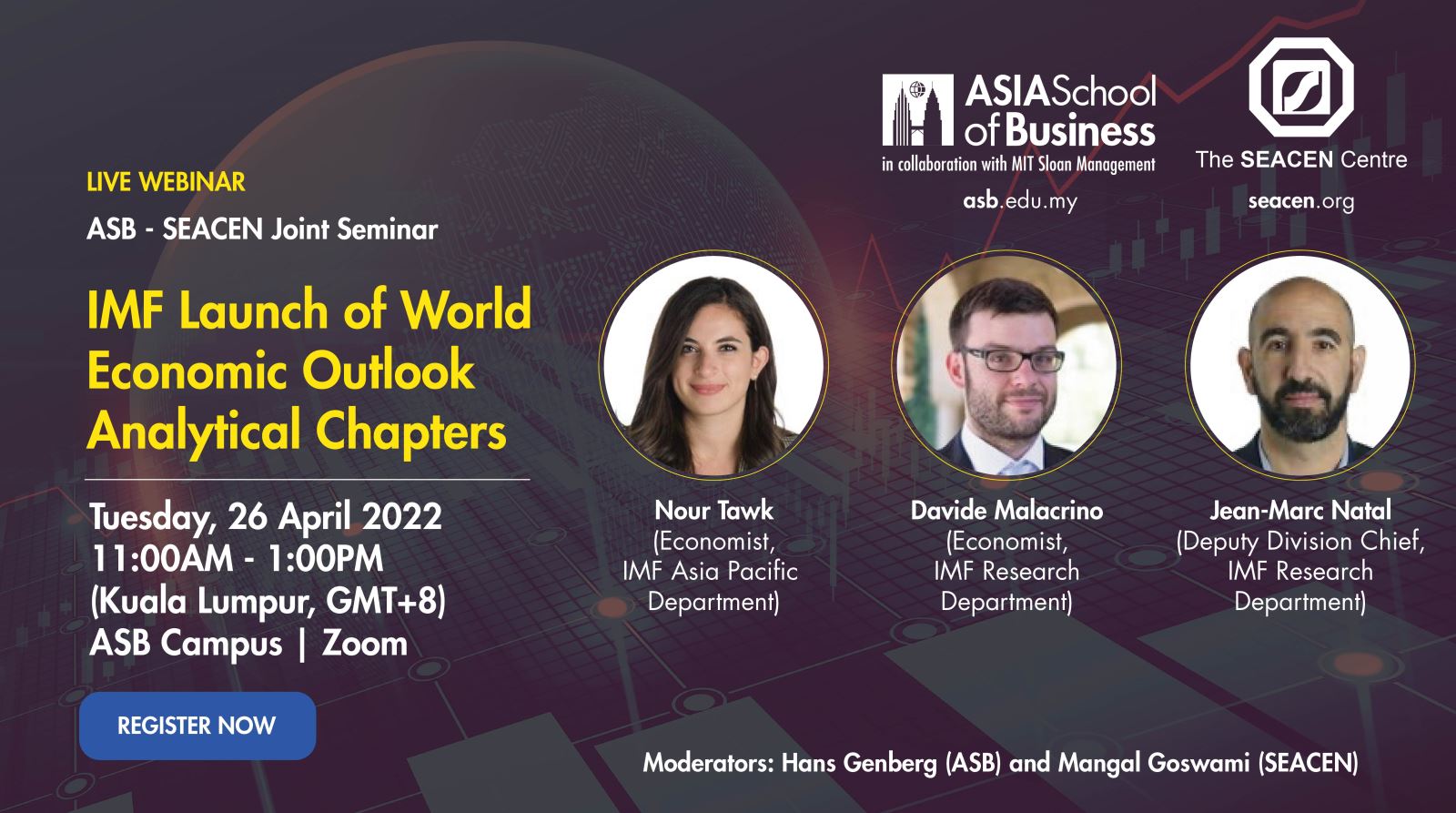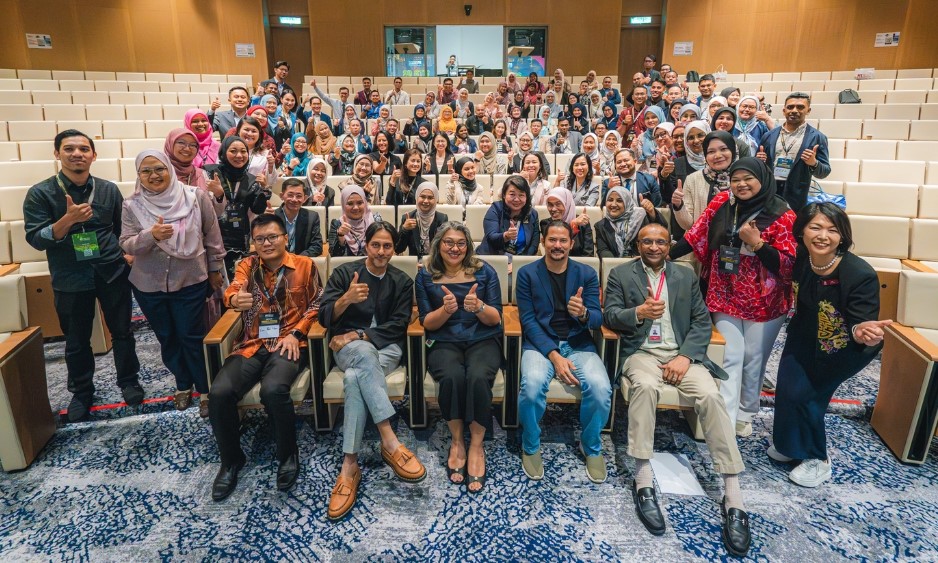
Asia School of Business in collaboration with The SEACEN Centre is organizing a joint seminar for IMF Launch of World Economic Outlook Analytical Chapters.
**THIS IS A HYBRID EVENT. Limited seat number is available based on first come first serve basis if you would like to attend the seminar in-person at Asia School of Business.
- Global Trade and Value Chains in the Pandemicby Davide Malacrino – Economist, IMF Research Department
When COVID-19 hit, the combined supply and demand shock was expected to lead to a dramatic collapse in trade. However, trade in goods bounced back quite rapidly—faster than it has in previous global slowdowns like the global financial crisis. But trade in services still remains sluggish. And some sectors that participate heavily in global value chains, such as automobiles, experienced larger and longer disruptions. Along with on-going disruptions in supply chain logistics, this has prompted calls among policy makers to bring more production on-shore, which would lead to permanent changes in the structure of global value chains. In this context, the chapter investigates the following questions: (1) what were the main drivers of trade in the pandemic; in particular domestic pandemic intensity and pandemic containment policies, as well as international spillovers on trade from pandemic containment policies; (2) how did key GVCs adapt to the pandemic; and (3) what can governments do to help strengthen global value chains against future disruptions, which may arise not just from future health crises, but also from conflict, cyberattacks, or from climate-related weather events?
- Private Sector Debt and the Global Recovery by Jean-Marc Natal – Deputy Division Chief, IMF Research Department
During the pandemic, and in particular its most acute phase, government policies helped maintain private access to credit, staving off a deeper recession in 2020. This chapter examines whether the resulting increase in leverage may affect the pace of the recovery. As countries prepare to normalize monetary policy, assessing how leverage is distributed and its interaction with countercyclical policies is key to forecasting the pace of the recovery and calibrating the unwinding of pandemic-time support. Analyzes based on micro-level data show that the recovery is likely to be slower in countries where (1) leverage is concentrated among vulnerable firms and low-income households, (2) insolvency procedures are inefficient, (3) public and private deleveraging coincide and (4) monetary policy must be tightened rapidly.
- IMF’s Asia and Pacific Regional Outlook – Spring 2022 by Nour Tawk
While the growth outlook for Asia and the Pacific has been downgraded for 2022, the region remains the world’s most dynamic. Headwinds to the region’s recovery include trade and commodity price spillovers from the Ukraine war, the tightening of financial conditions amid US monetary policy normalization, and COVID developments in some countries. High global food and fuel prices have added inflationary pressure in much of Asia, hurting the poor the most. Medium-term scarring from the pandemic in emerging and developing Asia is expected to be significant. Risks are tilted to the downside and include further escalation of the war in Ukraine, new COVID waves, a larger than expected slowdown in China, and tighter global financial conditions. Over the medium term, the potential fragmentation of supply chains and geopolitical tensions is a big risk to a region that has benefitted from globalization over the last few decades. Rising inflation and slowing growth are worsening an already-difficult tradeoff facing policymakers. With output gaps still large in many countries, the withdrawal of fiscal policy stimulus will need to be well calibrated to support the post-Covid recovery, structural transformation, and protect the vulnerable from rising food and fuel prices while the pace of consolidation is articulated in medium term fiscal frameworks focused on maintaining debt sustainability. In countries with more advanced recoveries, signs of de-anchoring of inflation expectations and/or external pressures, continued tightening of monetary policy will be required.
About the Panelists:
Nour TAWK – Economist, IMF Asia Pacific Department’s Regional Studies Division
Ms. Nour Tawk is an economist in the IMF Asia Pacific Department’s Regional Studies Division, contributing to the Regional Economic Outlook, and a desk economist for Malaysia. Prior to that, she worked in the IMF’s Monetary and Capital Markets Department on the Global Financial Stability Report, and the IMF Regional Office for Asia and the Pacific in Tokyo, Japan. She has also done surveillance work for Fiji and was part of the Financial Sector Assessment Program teams for Italy and Japan. Her most recent research focuses on the health consequences and economic effects of COVID-19 containment measures. Her research interests include emerging market economies’ policy responses to capital flows, spillovers from unconventional monetary policies, and systemic variations in bilateral exchange rates. She holds an MA and PhD in Economics from Keio University in Tokyo, Japan.
Davide MALACRINO – Economist, IMF Research Department’s Multilateral Surveillance Division
Davide Malacrino is an Economist in the Research Department of the IMF, where he has worked on structural reforms and multilateral surveillance issues. Previously, he was in the European Department where he has done surveillance work for the euro area and for Iceland. His research in labor economics and household finance has been published in academic journals and focuses on earnings dynamics, income and wealth inequality, and entrepreneurship. He holds a Ph.D. in Economics from Stanford University.
Jean-Marc NATAL – Deputy Division Chief, IMF Research Department’s World Economic Studies Division
Jean-Marc Natal is Deputy Division Chief of the World Economic Studies Division in the IMF’s Research Department. Prior to joining the IMF, he was Deputy Director of Research at the Swiss National Bank and taught Monetary Theory and Policy at the University of Geneva. His research is published in various economics journals, including the Economic Journal, the Journal of Money, Credit and Banking and International Finance and covers the study of monetary and exchange rate regimes, policy transmission, inflation dynamics and macroeconomic modeling. He holds a PhD in International Economics from the Graduate Institute of International Studies in Geneva.
Registration is no longer available because the registration deadline has passed.






